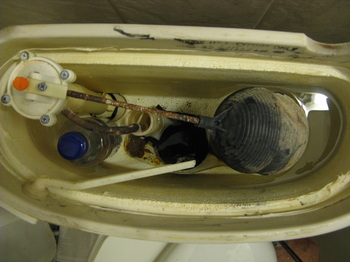|
Two days ago, before meeting up with a friend, I stopped into a pizza place to grab supper. (don't worry, I don't normally eat pizza for dinner). Choices for pizza: cheese, pepperoni, veggie, lots of meat. I knew that I should pick cheese, or veggies with no meat, but I went with pepperoni. This happens to me pretty much every time I go to a restaurant. And every time, I feel guilty about it, but I never eat meat at home, so I always see it as a rare treat. I'm tired of feeling bad about it, and I know I should do better. New challenge: Factory Farm Meatless May. I can eat hunted, ethically raised local and organic meat, but no conventional, factory farm meat for the whole month of May. I have to admit something embarrassing: I LOVE the taste of processed meats. I rarely eat a steak or a hamburger, but I could probably eat a hot dog every day. I know, I know: hotdogs, saussages, bacon, lunch meat...these are disgusting. But they taste amazing, and occasionally I indulge at restaurants. I'm not really a vegetarian (I think in moderation, it's good to eat hunted or ethical, organic, local meat is okay) and I eat meat at a restaurant maybe once every week or two. At home, I'm a veg stir fry or pasta salad kind of girl. It's silly that I only eat meat at restaurants - if I'm going to purchase meat, shouldn't it be the kind of meat that I want to support, not from a factory farm? I kind of rationalize it by saying that I don't eat meat in the other 85 meals in the month, so 1 chicken quesadilla, 2 ham sandwiches, 1 hotdog, and 1 steak in a month isn't that bad. Lame excuse. I had a really good experience with the Zero Waste Challenge for the month of March. My friends and family knew that I was doing it, my blog readers (...crickets chirping) knew that I was doing it, and I even got some random comments that people thought it was a good idea or that they were inspired to cut down on their garbage too. I already do most of the things environmentalists are "supposed" to do: eat organic and local, reduce packaging, turn down the heat, take a short shower, walk or take public transportation everywhere. So how can I keep raising the bar, especially without banning everything suddenly and making myself seem like an eco-nut? (Actually, I may have already reached that distinction.) Bring on the month-long challenges. Two documentaries that I've seen lately have made me think that this kind of project can get people talking, and show others that another way is possible:
4 Comments
In the environmental science class that I teach, one of the assignments is for the students to calculate their ecological footprint, write a response on it, and choose one action to change for the next two weeks. I always love reading these assignments! It's later in the semester, so students have learned more or less where their food and energy comes from, a little about global water issues, and are generally more aware about environmental issues than when they started. Some students are surprised, or horrified even, when they learn that if everyone lived the way they did, we would need four or six earths. Some aren't - they assumed that their lifestyle was pretty average, and by now we've learned in class that Americans generally produce more waste and use more oil per capita than most other countries. For their two week lifestyle change, some students usually choose to go vegetarian (some had always been curious what it would be like, or if they could even do it for so long). Some students decide to take shorter showers (from 30-45 minute showers down to 6 minute showers)...I don't even know how you can take a 45 minute shower. Sometimes students find these actions fairly easy, and feel that they can adopt it somewhat permanently into their life, but I'm sure that many students just take it as an experiment. Either way, this is the best way that I can come up with to challenge the students to try a change to reduce their impact. And for myself? I also do the assignment (but I don't have to do the writeup! The perk of being a teacher). My ecofootprint has very slowly decreased over the past two years, as I've found new ways to use less. For the past assignments, I've stopped using a clothes dryer at home (I installed a pretty sketchy looking clothesline in my room), asked my landlord to turn down the heat (this was not successful, but now we have our own thermostat so I can keep the apartment a chilly 18 all winter long. I have lots of fluffy socks), and joined a community supported agriculture (from Lufa, the amazing Montreal-based rooftop greenhouse). I have to say that joining a CSA probably made the biggest impact, since all winter long I've been eating more in season (I never want to eat another freaking beet or turnip again) and since it's all local and organic, I think I've cut down on my pesticides and transportation. This year, I decided to reduce my water consumption. I had a few goals for my two weeks: 1) put a full bottle in the toilet tank to reduce the amount of water used for flushing every time 2) FINALLY change the low- flow showerhead that I got for my birthday two years ago (I know, I ask for very exciting birthday presents) 3) fix all the damn leaky faucets in my apartment It was pretty easy to put a full water bottle in my toilet tank, once I figured out how to put it in there it without knocking into anything. Surprisingly, my toilet still works totally normally, and I'm sure you can't notice that there's less water used for flushing.  Same with the low-flow showerhead. It was hard to unscrew the old showerhead, so I had to convince my brother to come over with some tools to change it. I thought at first that it would be a little unpleasant to shower with less water, but I can't really tell the difference, and it saves tons of water. My last goal was to fix all my leaky faucets myself. I asked for help on this one too, but I could only turn the water off for one of the faucets. I did fix one leak, but I couldn't fix the others. Those will have to wait. In the meantime, I think I'm saving a lot of water with my low-flow showerhead and my home-made low-flush toilet. In the permaculture class I'm taking, a reoccuring idea is to produce more positive than negative effects. For example, farming in a conventional way tends to use lots of pesticides, tilling which increases soil erosion, and fossil fuels. Using permaculture principles, you could build a pond near your garden (so you could recharge the aquifer and wouldn't have to water it as much), plant crops that complement each other and have beneficial effects, and use compost from kitchen scraps instead of buying fertilizer. I think this is a great permaculture example. Now how do I apply this idea to my whole life?
Since I was a little kid, I realized that as long as I was a human in western culture, I would probably be using way more resources than I would be putting back. Sure, I try to reduce my ecological footprint as much as possible, but let's face it: I live in a typical apartment, I work at a regular job, I don't eat as much local/organic food from a farmers market as I would like, and whether I like it or not, I am a part of mainstream culture. Sometimes I drive my car. Sometimes I eat meat. Sometimes I go on airplanes to faraway locations. I can justify this to myself all I want: sometimes taking a bus to a rural location is not practical, sometimes eating meat is good for my diet, and sometimes I just like to go on vacations to exotic places. Sometimes I want to go all out: become a vegan, transform my car into some kind of combination biodiesel/mobile organic farm, stop using electricity, only take transportation that requries me to self-propel. A student in my class this semester asked me: Shona, since you believe so strongly in climate change, how can you keep living a normal life? Why don't you go off the grid and become totally self sufficient? I responded by saying that I'm an environmental science educator, so living in the woods by myself somewhere is not condusive to helping other people understand why our society needs to transform into something more sustainable. I think that's only part of the answer, and I'm still working the rest out. My hope is that my actions and projects can contribute to my postive impacts. I may not be able to reduce my ecological footprint entirely now, but I can try to teach others and hopefully spark a chain of events that will somehow offset my impact. Maybe this is just me trying to justify my presence on earth, but it is my hope. |
About ShonaI'm an eco-conscious girl from Montreal, Quebec. I'm currently an adjunct science professor at Champlain College of Vermont (Montreal Campus). I'm interested in any opportunities to expand my experience with grassroots activism, climate change legislation, or environmental education. Archives
March 2016
Categories
All
|


 RSS Feed
RSS Feed
